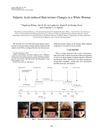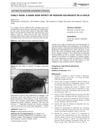TLDR Valproate can cause rare hair curling in some patients.
Valproate, commonly used for treating bipolar disorder and epilepsy, has been known to cause hair loss and color changes, but hair texture changes, such as curling, are rare. In a study of 250 patients, 2% experienced hair curling due to valproate. This document reports the first known case of a bipolar disorder patient, a 47-year-old woman, developing curly hair after six months of valproate treatment. Despite this side effect, the patient preferred to continue valproate due to its effectiveness in managing her condition. The exact mechanism behind valproate-induced hair curling is unclear but may involve the chelation of metals and inhibition of metallic enzymes. Psychiatrists should inform patients about this potential side effect.
46 citations
,
December 2014 in “Epilepsy & behavior” Some antiepileptic drugs can cause weight gain and hair loss, especially in women.
17 citations
,
January 2008 in “Journal of the American Academy of Dermatology” Valproic acid can cause hair loss, but information on hair color change is not detailed.
 13 citations
,
January 2007 in “Epilepsia”
13 citations
,
January 2007 in “Epilepsia” Valproic acid can cause reversible hair curling and persistent hair thinning.
 3 citations
,
June 2023 in “Medicines”
3 citations
,
June 2023 in “Medicines” Some antiseizure medications can cause reversible hair loss, with valproate, lamotrigine, and carbamazepine being the most common.

Nanocarriers with plant extracts show promise for safe and effective hair growth treatment.
 January 2019 in “Pediatric Oncall”
January 2019 in “Pediatric Oncall” Sodium valproate can rarely cause curly hair in children.
3 citations
,
November 2019 in “Clinical psychopharmacology and neuroscience/Clinical Psychopharmacology and Neuroscience” Valproate can cause both hair loss and curly hair in bipolar disorder patients.
 January 2017 in “Springer eBooks”
January 2017 in “Springer eBooks” The document explains various skin conditions and their treatments.




